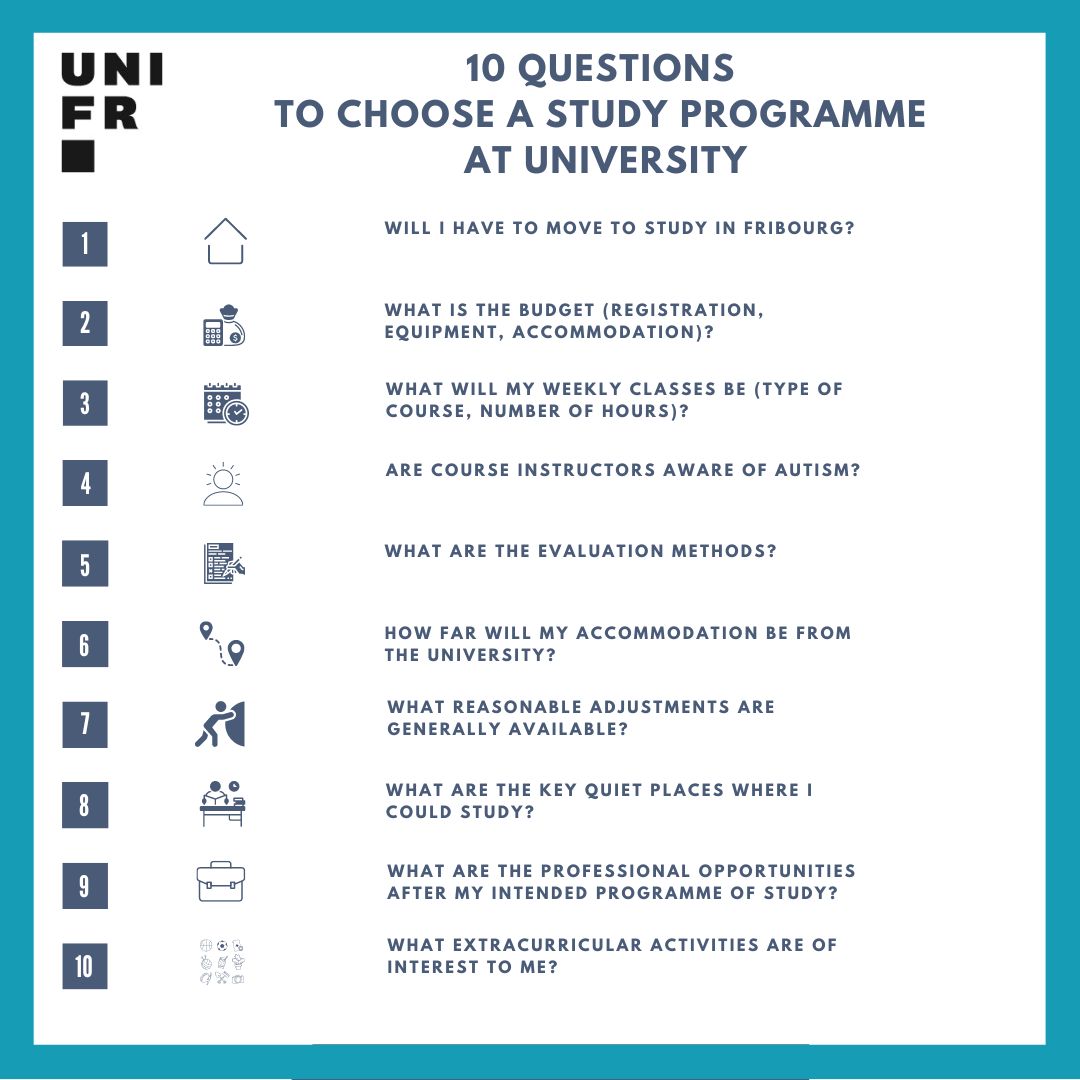This article will help you decide which university and which course of study you want to study at, and who to contact if you have any questions.
Context
The general area in which you decide to study is called a “course of study” or “study programme “. Some programmes are very comprehensive in themselves, others allow you to choose courses in a secondary track.
As with all of life at the University, there is a great deal of freedom and choice for students.
While many students traditionally start university after the final school leaving exams, a growing number of students follow a more original path. For example, some students wish to start a second education, others return to school after years of parental, sporting or professional activities and wish to consolidate their knowledge with an official diploma, while others start with an apprenticeship, a professional qualification and then “a bridge” to university.
There is no such thing as a typical student profile! Everyone has their own story, which is what makes university studies so rich.
Most college students hesitate for a long time before choosing a study programme and remain unsure of their choice until the moment they get there. There are many questions: Will I be passionate enough about the subject to study it for several years? Will I be able to find a job while I’m studying? Am I good enough to study in this field?
In all study programmes, courses are delivered in a variety of ways: ex-cathedra (teacher speaks, students listen and take notes), lectures, group seminars, practical sessions, online courses, weekly two-hour courses or full-day block courses, one-off, semester or yearly courses, some modules are elective while others are compulsory. In addition, your study programme may include internships, field trips, or off-campus stays.
Except in some explicit cases, the teaching method is not clearly communicated in advance to future students. Therefore, the different ways of teaching cannot easily be a criterion for choosing a particular study programme.
Many students look carefully at the content of the courses before deciding. Even though the course names may sometimes seem vague or unclear, some interesting information can be found on the timetable platform of the University of Fribourg.
Which university for my studies?
For many students, a choice of study programme involves moving house. Leaving home or moving house is a huge change. Such an upheaval can seem insurmountable to someone who doesn’t like to change their habits.
In order to make a confident choice, it is useful to have time to visit the cities you are considering. Going for a walk in the city and even in the university with a trusted person can help make the idea of studying there more concrete.
You can always ask for an interview with the study advisor for the course you are interested in. You can also find out about accommodation options in the city in question. It is also useful to look at the course schedule, as it often remains fairly stable over the years and can help you plan your days at home or at university. Another question that can help in making a choice is the transportation available and the time it takes to get from home to the university.
The section choosing your accommodation will give you a clearer idea of the accommodation possibilities in Fribourg.
Choosing a study programme
Often, a guidance counsellor will come to the classrooms during your secondary ll school education to help future students choose their path to college and answer their questions.
You can also make an appointment with a career counsellor at any time, at any age, before, during and after your studies. In Fribourg, you can contact the career guidance service free of charge.
The University of Fribourg offers an information service on studies for future students and registered students: it is the Student advice and information page, on the website of the University of Fribourg under “Conseil aux études à l’Université de Fribourg”.
The publication of study offers can be found on the web portal http://studies.unifr.ch/en. This portal can therefore also be useful for choosing a study programme.
Information day
Every year around November, the University of Fribourg organizes an information day for future students. This day allows them to better understand the various university programmes they can choose from. It is organised in such a way that allows you to visit stands to obtain information on the different study programmes. Students are often present to answer your questions. You can talk to them to get their impressions and advice about a particular study programme.
Often, on the same day, you can register to attend a conference on a particular study programme.
To find out more about the various events organised by the University of Fribourg, you can also regularly check the agenda page.
University of Fribourg Student Council
Each department at the University of Fribourg has a person in charge of answering questions from students, whether they are future students or current students. They are called student advisors.
You can call or write directly to the academic advisor for your intended study programme. This person will be able to give you relevant information and answer your questions. They will also be able to help you design your study programme if you wish to arrange your modules over a longer period.
In order to find the right person, you need to know which faculty your intended course of study is in. On the “student advice and information” page, you can click on the department you are interested in to get the contact information.
What does that have to do with me?
When you have to choose a study programme, you often feel that you are somewhat alone, while in fact hundreds of other students might be having the same doubts. The choice of study programme is important, of course, but it is not final. You can choose and make a mistake – it is actually very common and shouldn’t be considered a failure. All the information that can be gathered before the beginning of the studies is useful, but in reality, one will know if the choice was good only after having started the course.
If you are unsure of what to do, it is possible to sign up for several different tracks and spend the first few weeks navigating between them before making a final choice. But this is not recommended as it is very stressful and might lead you to do things “half way” in both tracks, and then have to catch up on work in the track you finally chose. If the choice made was not the right one, it is often easier to wait until the end of the semester or academic year to change your study programme.
In Switzerland, universities are beginning to have dedicated services to support students with special needs. You may wish to contact the universities you are considering to find out what support is available for students on the autism spectrum. At the University of Fribourg, you will find information at the Studies and Disability Office.
In addition, you may also be interested in learning about the university’s recreational facilities. Are there any sports courses or clubs you would like to join? At the University of Fribourg, there are several student associations under the umbrella of the AGEF student association, which is your best source for these types of questions. There is also a rich and varied sports offer which is detailed in the chapter on social and recreational life at the University.
Finally, if you are concerned about financial matters, you can find information on this platform in the Financial Supports for Students section.
What is the next step?
Make a list of the study programmes that interest you in order to compare them
Practical advice
- In order to make the right choice, it is useful to consider the selection criteria that are essential for you
- Some students have found it useful to make a comparison chart. Each student will have their own priorities! You may be interested in the following criteria for creating this chart (choose the ones that are important to you)
- the distance to travel between the accommodation and the university
- fees (registration, equipment, accommodation)
- the number of hours of weekly classes
- autism awareness for lecturers
- existing support for the field of disability
- teaching flexibility in terms of students’ preferences
- availability of the measures for reasonable adjustments
- library services
- the availability of quiet study areas
- extra-curricular activities of interest to you
- The names of the modules or courses do not always explicitly relate to their content. If this seems relevant to you, or if you have trouble understanding the link between modules, ask your student advisor or go to Course catalogue timetables for the University of Fribourg. Note the name of the teacher or the course in order to discover the type of course given
- A preliminary internship in the professional environment concerned can also help to make the meaning of the particular studies more concrete before starting them
- Try to get in touch with other students. In Fribourg, groups of students from different study programmes meet in what is called the Fachschaft. In principle, the students of the Fachschaft are open to answer questions from other students
- Take the time to visit different universities, tour the campuses, visit the accommodation, and try to talk to the people in charge of the study programmes. Try to get an idea of what life would be like near your chosen university
- When visiting several different universities, take a camera and a notepad to record important details according to your essential criteria
Questions to ask yourself
- Which study programme(s) are you interested in?
- Are there any professional opportunities for this study programme? Which ones?
- Would you like to do an internship in this professional field to be more sure of your choice?
- Could you live at home and commute to the University?
- Do you feel ready to live independently away from your parents?
- Did you understand the overall curriculum (timetable, content, options)?
- Have you received the information you are interested in about the evaluation process?
- Have you budgeted for the costs involved in your choice of study programme?
- What support does the University offer to students with autism?
- Are there any student associations related to my specific interests?
About the author
Edited by: Nathalie Quartenoud ©
Translated by: Daniel Dukes


 Back
Back 